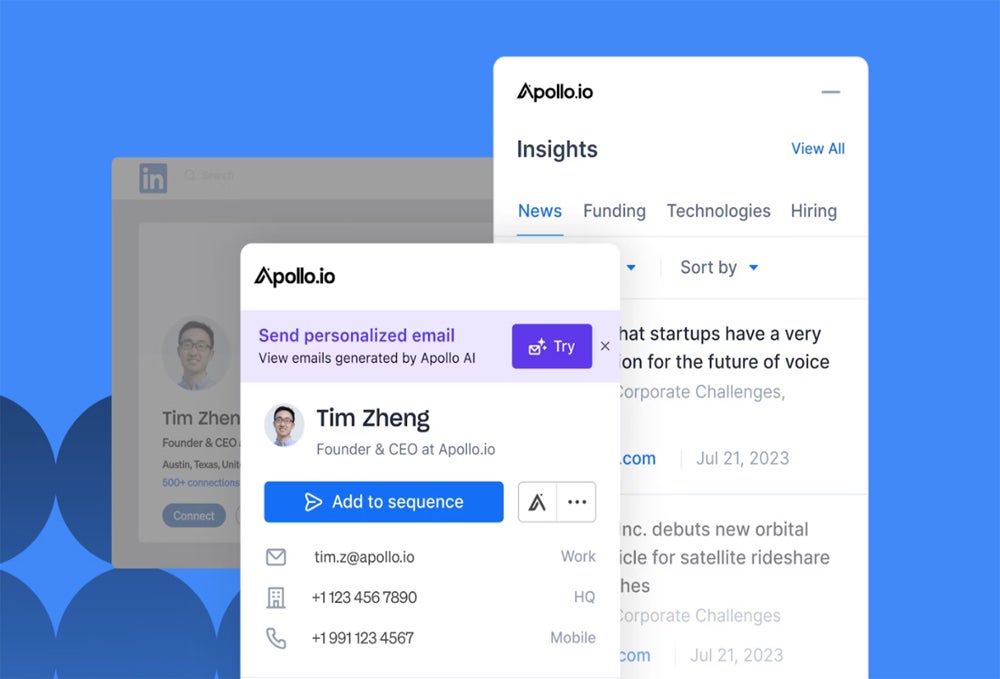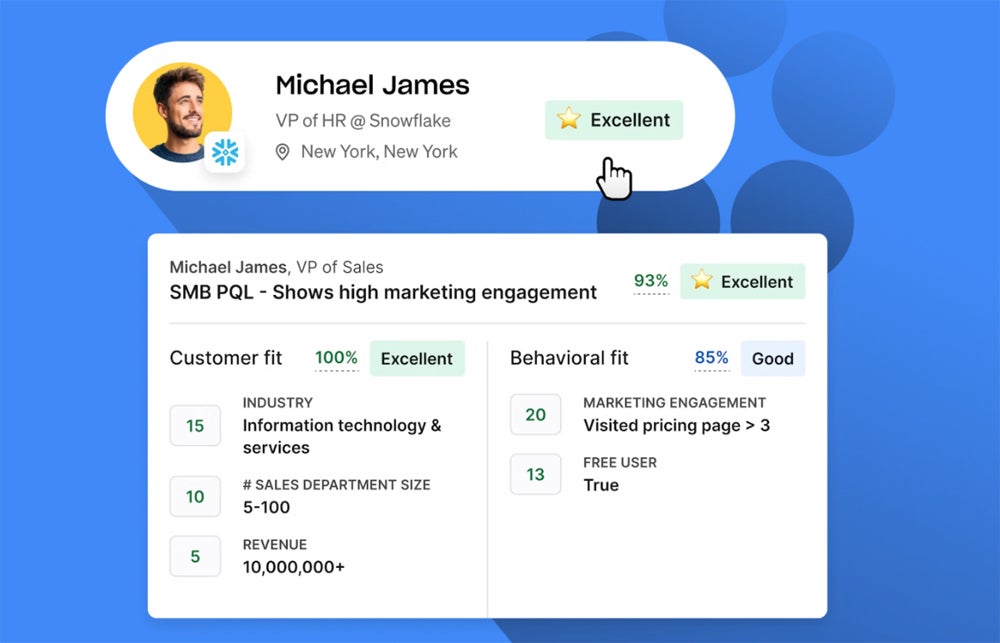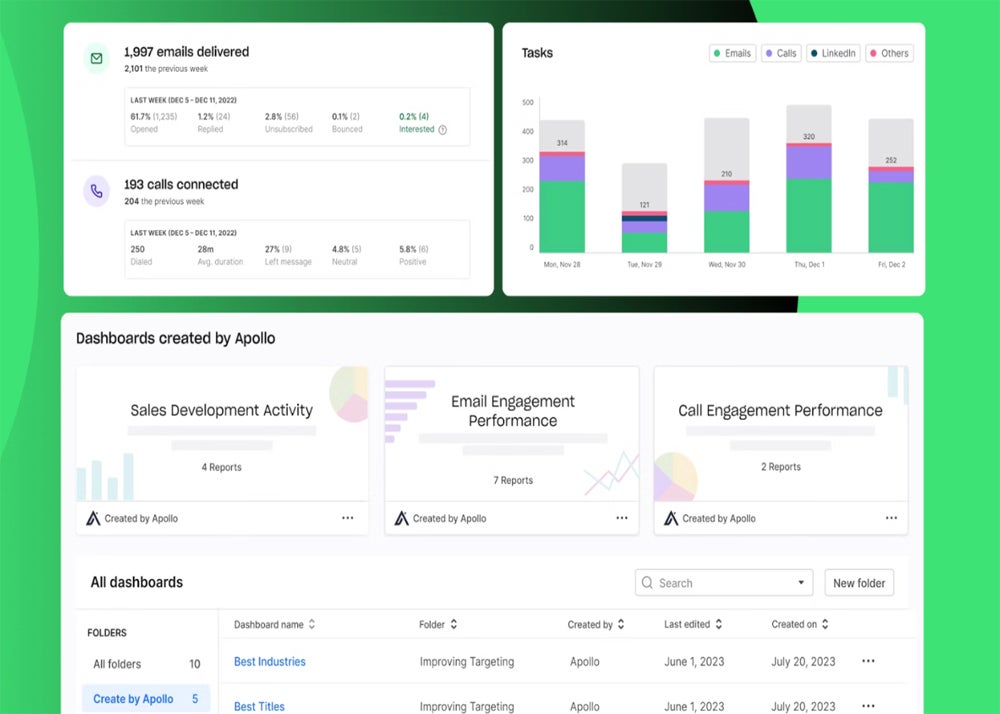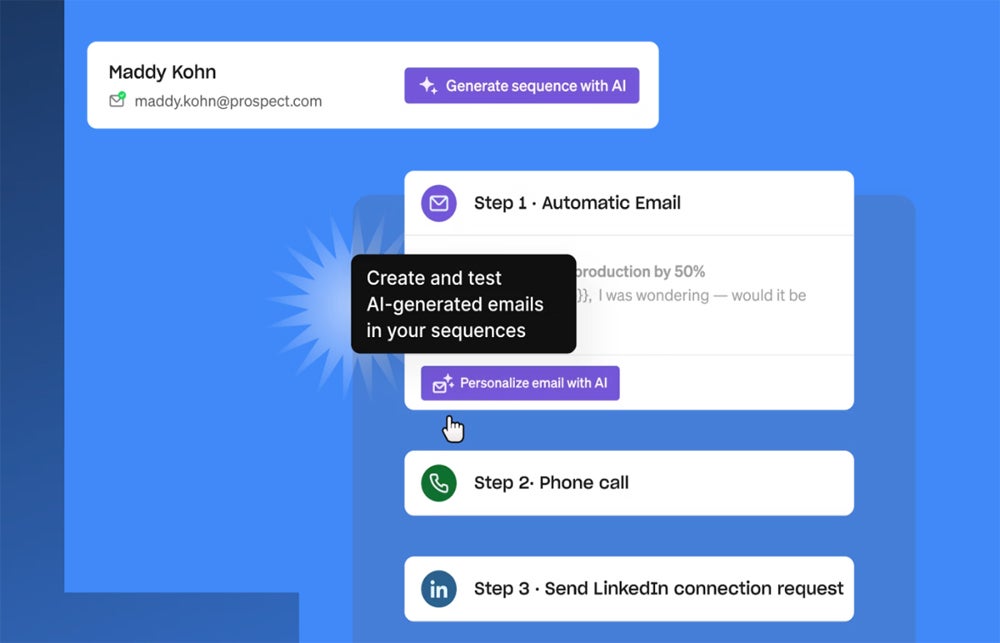Apollo Quick FactsOur product rating: 4.1/5 Prices: Apollo offers a limited free version of its solution. Key Features:
|
Apollo is a leading B2B database provider that also offers an interaction suite and workflow engine solution. As a marketing platform, Apollo has a current database of over 275 million contacts and 73 million businesses for accurate and massive prospecting. Apollo users can target leads and accounts that fit the company's ideal customer profile, and scale outreach activity with automations.
Apollo's target audience includes sellers, marketers, and owners of startups and large enterprises. With the platform's available integrations, users can sync Apollo with their existing CRM software. This way, users can ensure that contacts and accounts in the CRM are up-to-date by enriching them with data from Apollo's dynamic database.
While Apollo offers a good mix of features and pricing, there are other providers that may be a better fit for your business, depending on your needs.
1
Monday CRM
Employees by company size
Micro (0-49), Small (50-249), Medium (250-999), Large (1000-4999), Business (5000+)
Any size of company
Any size of company
Characteristics
Calendar, collaboration tools, contact management and more
2
CRM capsule
Employees by company size
Micro (0-49), Small (50-249), Medium (250-999), Large (1000-4999), Business (5000+)
Any size of company
Any size of company
Characteristics
Calendar, collaboration tools, contact management and more
3
HubSpotCRM
Employees by company size
Micro (0-49), Small (50-249), Medium (250-999), Large (1000-4999), Business (5000+)
Micro (0-49 employees), small (50-249 employees), medium (250-999 employees), large (1000-4999 employees)
Micro, Small, Medium, Large
Prices
Apollo's pricing structure is divided into four tiers, including a forever free plan. Pricing is billed per user and comes with a pre-set amount of mobile and export credits per year, along with additional platform features. Apollo also offers a 14-day free trial.
- Free version: Unlimited email credits, 60 mobile credits per year and 120 export credits per year. Features include basic automations, filters, purchase intent, AI-assisted email writing, and more.
- Essential: $49 per user per month, billed annually, or $59 per user per month when billed monthly. Users receive unlimited email credits, 75 mobile credits per year, and 1,000 export credits per year. Their plan features include job change notifications, data enrichment, A/B testing, and more.
- Professional: $79 per user per month, billed annually. $99 per user per month when billed monthly. Users receive unlimited email credits, 100 mobile credits per year, and 2,000 export credits per year. Features in this package include all the basics, plus no sequence limits, advanced reporting, email tracking, manual tasks, call recordings, and more.
- Organization: $119 per user per month, billed annually, or $149 per user per month when billed monthly. Users receive unlimited email credits, 200 mobile credits per year, and 4,000 export credits per year. This tier comes with all the features of Professional, plus call transcriptions, customizable reports, advanced security settings, and more.
Apollo Key Features
Search for contacts and accounts
Finding contacts and accounts is a critical part of prospecting for leads and building B2B databases of valuable leads. Users can then create lists with more than 65 filters, including contact title, job function and account location or industry, number of employees, and revenue. This search and list building feature identifies key stakeholders in an account and uses signals like intent data, website visitor tracking, and job changes to communicate when the time is right.

Scores and signs
Assigning scores and signals to leads allows users and sales reps to quickly identify and strategize how and when to engage with high-value leads. Within Apollo, users can define their own criteria and variables to create a unique lead scoring model. From there, combine demographic and behavioral signals to quickly create lists of ideal prospects and add tips to ensure the outreach team is prepared for the conversation.

Report analysis
Companies can gain insight into metrics using custom or pre-built reports and dashboards from a wide range of metrics. For example, users can visualize the success of automation and the effectiveness of messages. There is the added benefit of being able to run and track A/B tests. This way, organizations can get a holistic view of overall prospecting performance and engagement data from a single dashboard.

Sales commitment
Apollo not only creates lists of high-value leads, but also allows users to create outreach and engagement strategies from within the platform. Businesses can create custom sequences and automations or use pre-built templates that include emails, calls, automated LinkedIn tasks, and more. Additionally, Apollo's AI assistant can assist in the email drafting process for recommendations, personalization, rephrasing, and more.

Pros and cons of Apollo
| Users praise the experience and intuitive user interface. | Users have requested more onboarding training for the platform. |
| 98% email accuracy. | There is no mobile app to access data and contact information while traveling. |
| More than 275 million contacts currently. | User reports of inconsistent international data. |
Alternatives to Apollo
Some of the top Apollo alternatives include Zoominfo, UpLead, Lusha, and more. These B2B databases offer basic features similar to what users would expect from Apollo, with their own individual use cases and advantages and disadvantages. Whether you're looking for a tool for your small business, startup, or enterprise, or if certain advanced features are a top priority, there's a provider that can meet your exact needs.
| Prospect evaluation | ||||
| Buyer intent data | ||||
| Sales commitment | ||||
| Free trial duration | ||||
| Starting price* |
*Price when billed annually

Zoom information
Zoominfo is a B2B database and lead generation company for sales, marketing and recruiting teams. Zoominfo and Apollo can qualify, segment, and route inbound leads based on pre-set criteria set by a business. Compared to Apollo, Zoominfo does not have transparent pricing, but it does have a 14-day free trial for its platform and can support multiple industries.
For our full comparison of Apollo and Zoominfo features, pricing, and more, check out our Apollo vs. Zoominfo article. Zoominfo.

Up lead
UpLead is another B2B database that can filter up to 50 unique search criteria for users to get very specific leads. UpLead and Apollo can offer more information beyond simple contact information, such as demographic, firmographic, and technographic data. Compared to Apollo, UpLead has a much shorter trial period but has a 95% data accuracy guarantee.

lusha
Lusha is an affordable B2B database that offers advanced tools for businesses that prioritize data hygiene. Lusha and Apollo offer a free version of their platform that consists of a limited amount of lead information revealed per month. Compared to Apollo, all four Lusha pricing tiers are lower cost and Lusha offers robust integrations.
Review methodology
When reviewing Apollo as a top B2B database provider, I considered the top offerings of the most popular solutions, cost transparency, and more. I rated Apollo based on an internal rubric made up of criteria reflecting what the average buyer might consider important when choosing a B2B database.
Below are the criteria I consider when rating and then reviewing Apollo:
- Cost: Transparency of costs, payment options and pricing compared to industry standards.
- Main features: Standard capabilities of an average B2B database provider, such as channel management or data cleansing.
- Advanced Technology Offers: Unique or industry-specific functionality that a vendor might offer in addition to core features.
- Customer Reviews: Average user feedback for the provider, whether praising or criticizing features, platform UI, or support.












